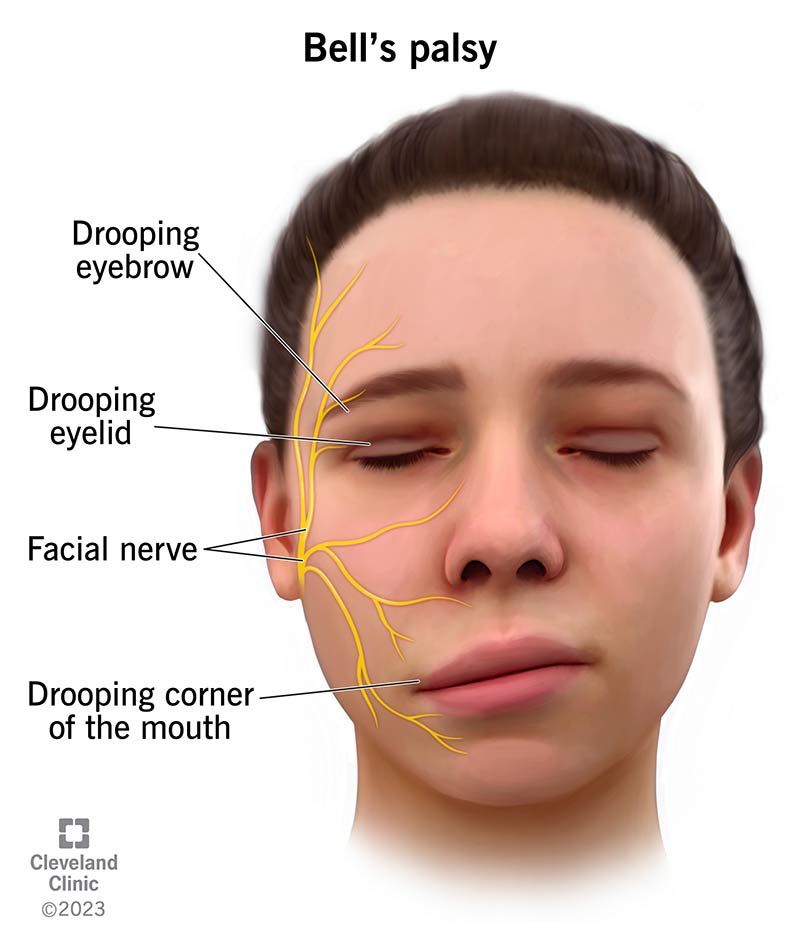Bell's Palsy

Definition
Bell's palsy is a sudden, temporary weakness or paralysis of the muscles on one side of the face. It is caused by inflammation or compression of the facial nerve (cranial nerve VII) and results in a drooping appearance on the affected side. The exact cause is often unknown, but it can be associated with viral infections.
Aetiology
Bell's palsy is primarily idiopathic, meaning the cause is often unknown. However, it is believed to be linked to viral infections such as herpes simplex virus (HSV), which causes cold sores, and varicella-zoster virus, which causes chickenpox and shingles. Other potential causes include trauma, autoimmune disorders, and, in rare cases, tumours.
Pathophysiology
The facial nerve controls the muscles of facial expression. In Bell's palsy, inflammation or compression of the facial nerve disrupts its function, leading to weakness or paralysis of the facial muscles. This inflammation is often due to a viral infection that causes the immune system to attack the nerve, leading to swelling and subsequent dysfunction.
Risk factors
- Viral infections (e.g., herpes simplex, varicella-zoster)
- Family history of Bell's palsy
- Diabetes
- Upper respiratory infections
- Pregnancy, especially in the third trimester
- High blood pressure
Signs and Symptoms
- Sudden onset of weakness or paralysis on one side of the face
- Drooping of the mouth or eyelid on the affected side
- Inability to close the eye on the affected side
- Drooling
- Loss of taste sensation on the front two-thirds of the tongue
- Increased sensitivity to sound in one ear
- Pain around the jaw or behind the ear on the affected side
- Headache
Investigations
- Clinical examination: Based on the characteristic appearance and symptoms
- Electromyography (EMG): To evaluate the extent of nerve involvement
- Imaging (MRI or CT scan): To rule out other causes of facial paralysis such as tumours or stroke
- Blood tests: To check for infections or other underlying conditions
Management
Primary Care Management:
- Early treatment with corticosteroids (e.g., prednisolone) to reduce inflammation and improve the likelihood of recovery. The recommended dose is 50 mg daily for 10 days.
- Antiviral medications if a viral infection is suspected, although their benefit is uncertain. Common antivirals include aciclovir 400 mg five times daily for 7 days.
- Analgesics for pain relief if necessary
- Protection of the eye on the affected side with lubricating drops, ointments, or an eye patch to prevent dryness and injury
- Referral to a specialist if symptoms do not begin to improve within three weeks or if there is significant pain or other concerning features
Eye care:
- Lubricating eye drops or ointments to protect the eye if it cannot be closed properly
- Eye patch or tape to keep the eye closed during sleep
Physical therapy:
- Facial exercises to maintain muscle tone and improve recovery
- Massage to stimulate the facial muscles
Surgery:
Rarely recommended, but may be considered in cases where facial nerve damage is severe and does not improve with other treatments.
References:
- O'Sullivan, S. B., & Schmitz, T. J. (2016). Physical Rehabilitation. 6th ed. F.A. Davis Company.
- Ballenger, J. J., & Snow, J. B. (2015). Ballenger's Otorhinolaryngology: Head and Neck Surgery. 17th ed. BC Decker.
- Ropper, A. H., & Samuels, M. A. (2019). Adams and Victor's Principles of Neurology. 11th ed. McGraw-Hill Education.
- McNamara, C. M., & Morgan, M. (2017). Current Diagnosis & Treatment: Family Medicine. 5th ed. McGraw-Hill Education.
- NICE. (2023). Bell's Palsy: Management. Retrieved from https://cks.nice.org.uk/topics/bells-palsy/management/
- Cleveland Clinic. (2021). Bell's Palsy. Retrieved from https://my.clevelandclinic.org/-/scassets/images/org/health/articles/5457-bells-palsy
Check out our youtube channel
Blueprint Page
Explore the comprehensive blueprint for Physician Associates, covering all essential topics and resources.
Book Your Session
Enhance your skills with personalised tutoring sessions tailored for Physician Associates.



